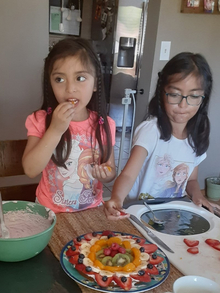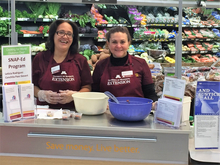Of Worthington’s 42% Hispanic or Latino residents, approximately 16% will develop type-2 diabetes, and 35% have prediabetes. Maria Conchita Paez-Sievert and Leticia Rodriguez are helping their community improve on those odds. The University of Minnesota Extension SNAP-Ed* educators teach I Can Prevent Diabetes (ICPD), a 16-week interactive class that brings people together to learn healthy habits.
Esmeralda Salas heard about the class from a friend. She joined to help her diabetic husband. When their teenage daughter participated, the whole family began to think more proactively about their health.
ICPD helped them see the value of staying healthy by reading labels, eating appropriate portions and shopping smarter. They also learned some exercises that Salas says were “fun.”
When the family became ill with COVID-19, Salas said, the Extension SNAP-Ed educators were there to help. “All of the time during quarantine, they helped us with tips. Conchita would call and check on us. I often say I could not have survived without this class.”
Moving online, keeping it personable
Paez-Sievert and Rodriguez shifted their teaching online during the COVID-19 pandemic, which hit Worthington hard. This helped them reach beyond town and removed barriers like transportation and child care. Their dedication included calling a participant who didn’t have a way to access Zoom so she could be included.
They also connected the class to local resources and Extension educators like Jose Lamas, who helped them with financial wellness. “We never saw our participants as numbers,” says Paez-Sievert. “We care about them and they become like family.”
Participants bonded, and this newly formed group of friends decided to help others together. In a collaboration with Seeds of Justice, they delivered food, medicine and household supplies to people unable to leave their homes. “This was personal for us, and we became advocates for them,” says Rodriguez.
*Supplemental Nutrition Assistance Program Education
Meeting the highest standards
University of Minnesota Extension SNAP-Ed received full recognition from the CDC-recognized National Diabetes Prevention Program in 2021, effective until September 2026, for delivering I Can Prevent Diabetes via distance learning.
This distinction is only given to organizations that meet the highest standards for average weight loss, attendance and retention, and physical activity minutes reported by participants.



